This last weekend I took part in something truly extraordinary: two days of discussion, with twenty smart, fascinating people who came from a variety of specialties to talk about American horror literature.
It wasn’t livestreamed. It wasn’t recorded. In fact, the participants were asked not to even take photographs of the actual discussions or of the lunches/dinners, where discussion continued.
All of us were flown to Providence, RI, put up at a superb hotel, taken out to some of the best restaurants in the city, and provided with an honorarium, meaning this wasn’t a cheap event.
It was completely ephemeral…and unforgettable.
I first received the invitation several months back; the director of this conference is a longtime friend and he thought I’d fit in. I was, truthfully, a bit skeptical when the invitation arrived; what was this foundation called the Liberty Fund? Was it actually some right-wing think tank, a front for propaganda?
Nope. It turns out the founder, Pierre F. Goodrich, was a rich guy who just loved good chats. Since the foundation was started in 1960, they’ve hosted over 7,500 conferences like this one. Their goal is to engender thoughtful discussion; by starting with a small, carefully chosen group, they hope to spread conversations across a wider audience. Mr. Goodrich’s favorite topic was liberty (hence the name of his foundation), so the conferences all come at that concept from whatever angle they’re pursuing, whether it’s paranoia in popular culture, the films of John Ford…or horror literature.
The official title of our discussion was “A Chilling Effect: Liberty’s Nightmares and American Horror.” We were provided in advance with an extensive reading list that included not just Poe and Lovecraft, Jackson and Oates, Le Guin and Ligotti, but also non-horror material (Moby Dick, Blood Meridian), poetry, and critical analyses. Because Lovecraft was featured prominently in the material, Providence (his hometown) was chosen as the site for the discussion.
Six themed discussion sessions took place over two days, with all of us seated in a big square; there was a system and a moderator who kept the discussion flowing and centered. The other participants included a film producer, a television writer, an actor, a VFX artist, another horror writer, a legendary comics artist, and university professors of literature and philosophy. One participant, who is an authority on 18th-century literature, admitted she didn’t even like horror.
So what did we talk about? Well, here are just a few of the threads:
What is the relationship between horror literature and justice?
How does horror comment on race?
Can horror genuinely provide catharsis?
Is perversity built into the work of writers like Poe?
Does horror suggest an innate hostility between men and women?
How does horror comment on the nature of sacrifice?
Is the liberty offered in some horror tales a trap?
Is horror an attack on life, or is it actually life-affirming?
Is it possible for horror to offer a happy ending?
In relation to our weekend, the answer to that last question is a resounding, “YES.”
By the time the weekend came to an end (with a final dinner at Gracie’s that included the best scallops I’ve ever had, and bonus points for being in a 1902 building that our waitress confirmed was - of course - haunted!), I felt like I had a lot of new BFFs. We’re staying in touch, using a Google doc to share more reading/viewing recommendations.
And then there’s…
LOVECRAFT
I admit to a lifelong love/hate relationship with Howard Phillips Lovecraft. I first encountered him via “The Outsider,” which showed up in one of my elementary school textbooks (yes, really - Lovecraft was in a grade school reader!). When I was a teenager, a librarian/cousin sent me a box set of Lovecraft paperbacks, and I absolutely devoured them. As a teenager, two authors obsessed me: Theodore Sturgeon and Lovecraft (I’d discover other author obsessions later).
But, even at (I think) 14, I could sense things going on in Lovecraft…ugly things beyond eldritch gods. By the time I was in my twenties, I was reading nonfiction about Lovecraft, and realized those early intuitions were right: the man was a racist. And no, I’ve never bought the “he was a man of his time” argument. Lovecraft was a virulent racist. His own wife cited his racism as one of the chief reasons for divorcing him.
And yet I’ve never stopped being fascinated by him, partly because there’s a bigger question about his racism which I rarely hear asked: is his racism a big part of what makes his fiction so (sometimes) brilliant?
I believe it is. Hence, my love/hate affair with the Old Gentleman.
It was interesting to hear discussion around him this weekend. Only 3 or 4 of us there were well-versed in his biography. Those who weren’t picked up on the racism in “The Rats in the Walls,” one of three Lovecraft stories we discussed (the others were “Dreams in the Witch House” and “The Picture in the House,” which is one of my favorite stories). They assumed Lovecraft must have been dour and anti-social; they were surprised to hear that he had a circle of friends he was dedicated to, and that he could be downright silly (as demonstrated in the goofy nicknames he shared with his friends).
However, my favorite comment about Lovecraft came outside of the group discussion, when five of us used our afternoon break-time to tour Lovecraft’s Providence, ending at his gravesite in Swan Point Cemetery, where we met a lovely young Chinese couple paying homage. One of the others in our group who knows Lovecraft as well as I do looked down at this grave and said, softly, “I just can’t bring myself to hate him.”
Agreed.

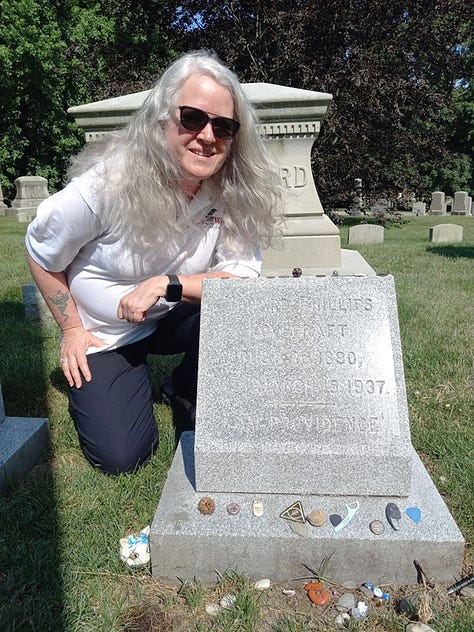

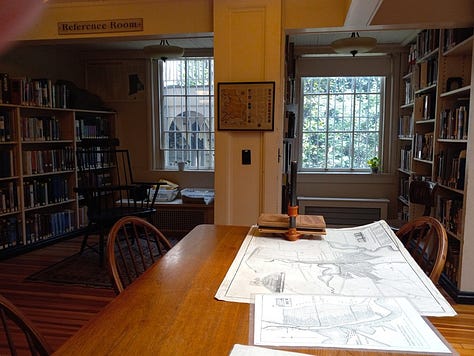
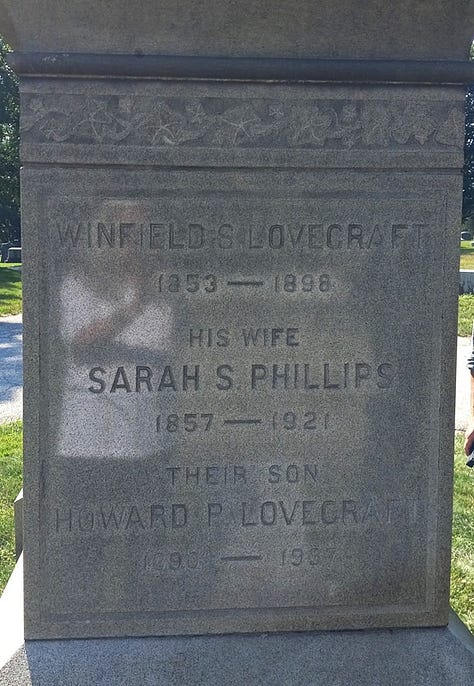

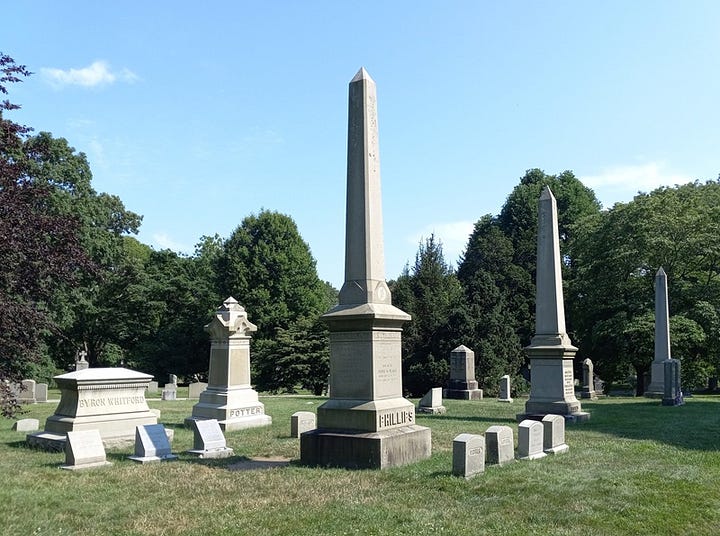
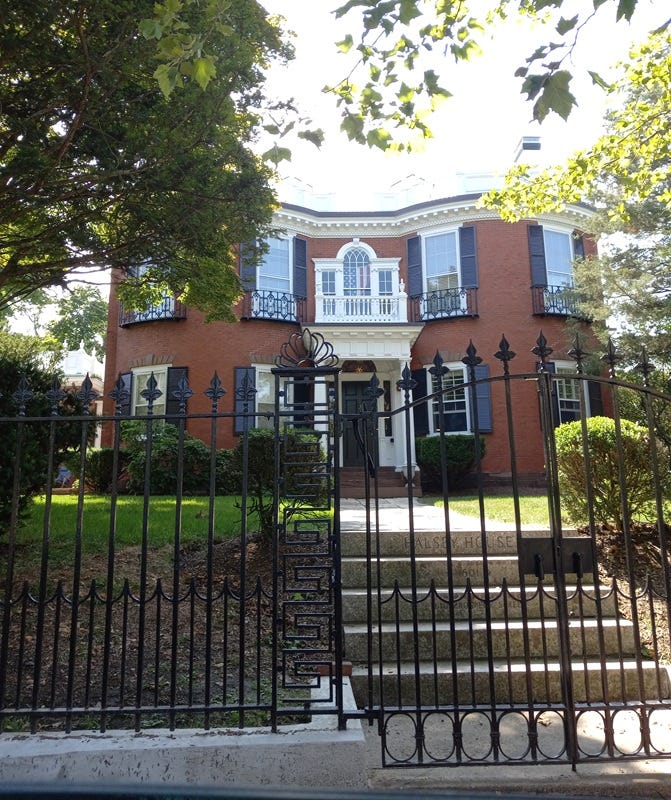
(The photos above, top to bottom and left to right: the St. John’s Churchyard, hidden among houses and where Poe courted Sarah Helen Whitman, who lived nearby; me with Lovecraft’s gravestone, well worn from decades of fans making rubbings; a house where Lovecraft lived; a reading area in the beautiful Providence Athenaeum, which Lovecraft frequented; the back of the family obelisk, which I didn’t know paired Lovecraft with his parents; Providence at night, looking across the Providence River; the Phillips family obelisk and (just to the left of it) Lovecraft’s marker at Swan Point Cemetery; the house that Lovecraft used as part of the basis for The Case of Charles Dexter Ward.)

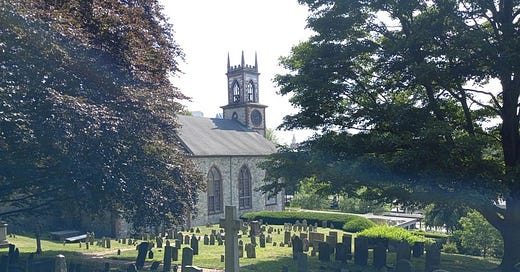




Lisa, thanks so much for this. And, agreed, we can't excuse Lovecraft's racism, especially not with the absurd justification, "he was a man of his times." I wrestle with this everyday with Thomas Jefferson.
Great piece - and a nice record of a very memorable weekend!